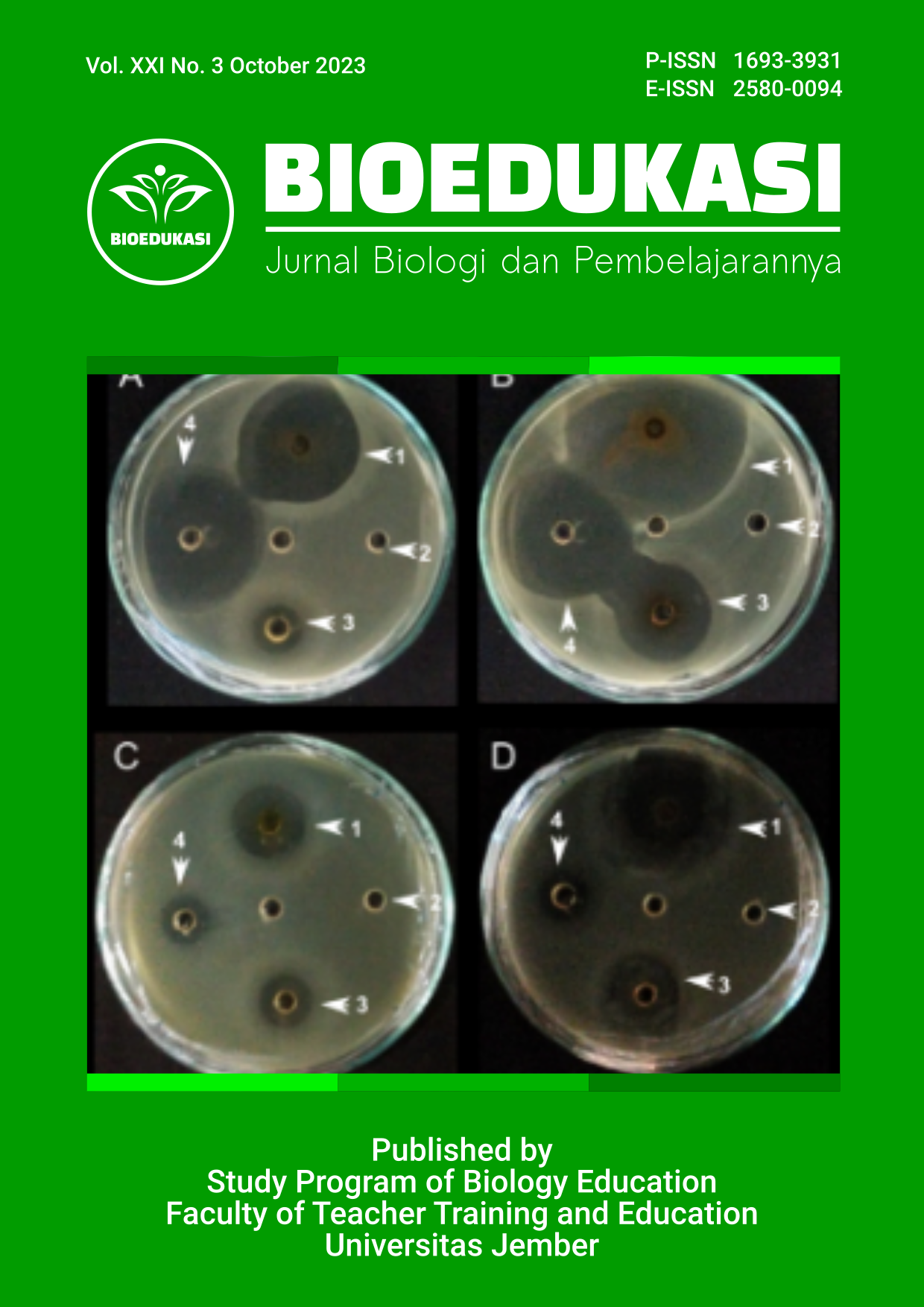The Effects of the PBL Based on the Socioscientific Issue Approach on Interdisciplinary Thinking and Argumentation Skills
DOI:
https://doi.org/10.19184/bioedu.v21i3.40731Keywords:
Argumentation, Interdisciplinary, Problem Based Learning, Socioscientific IssuesAbstract
The independent curriculum directs the education sector to develop socioscientific issues (SSI)-related interdisciplinary reasoning and argumentation skills that can be applied to biology education. This study aims to investigate the effects of the PBL-SSI model on students' interdisciplinary thinking and argumentation skills. This study used a Quasi Experimental design non-equivalent control group pretest-posttest design. The participants in this investigation were 71 10th grade students. Students were separated into two groups and evaluated using distinct learning models: (1) PBL-SSI, 11 males and 24 females; (2) PBL, 12 males and 24 females. PBL-SSI enhances the students' argumentation and interdisciplinary thinking skills in compared to PBL. PBL-SSI had an effect on inter-disciplinary reasoning and argumentation skills (p<0.05), according to the investigation results. PBL-SSI improved interdisciplinary thinking and argumentation skills more effectively than PBL.
Downloads
References
Anggraena, Y., Felicia, N., Ginanto, D. E., Pratiwi, I., Utama, B., Alhapip, L., & Widiaswati, D. (2021). Kurikulum untuk Pemulihan Pembelajaran (1st ed.). Pusat Kurikulum dan Pembelajaran Badan Standar, Kurikulum, dan Asesmen Pendidikan Kementerian Pendidikan, Kebudayaan, Riset, dan Teknologi.
Ariel, B., Hambar, M., & Sutherland, A. (2022). Experimental designs (1st edition). SAGE Publications Ltd.
Astuti, R, P., & Junaedi, I. (2013). Peningkatan Aktivitas Dan Hasil Belajar Melalui Pbl Pada Siswa Kelas X Sma. Lembaran Ilmu Kependidikan, 42(2), 93–100. http://journal.unnes.ac.id/nju/index.php/LIK
Dana L, Z., Benjamin C, H., Sadler, & Troy, D. (2019). New directions in socioscientific issues research. Disciplinary and Interdisciplinary Science Education Research, 1(11), 1–9.
Eggert, S., Ostermeyer, F., Hasselhorn, M., & Bogeholz, S. (2019). Socioscientific decision making in the science classroom: The effect of embedded metacognitive instructions on students’ learning outcomes. Education Research International, 12(1), 230–258.
Ewing, M., & Sadler, T. D. (2020). Socio-scientific Issues Instruction: An interdisciplinary approach to increase relevance and systems thinking. In The Science Teacher (pp. 18–21).
Fang, S.-C., Hsu, Y.-S., & Lin, S.-S. (2019). Conceptualizing Socioscientific Decision Making from a Review of Research in Science Education. International Journal of Science and Mathematic Education, 17, 427–448.
Freije, A. M., Hussain, T., & Salman, E. A. (2017). Global warming awareness among the University of Bahrain science students. Journal of the Association of Arab Universities for Basic and Applied Sciences, 22, 9–16.
Guilfoyle, L., Hillier, J., & Fancourt, N. (2023). Students’ argumentation in the contexts of science, religious education, and interdisciplinary science-religious education scenarios. Research in Science & Technological Education, 41(2), 759–776. https://doi.org/10.1080/02635143.2021.1947223
Istianaa, R., & Herawatia, D. (2019). Student Argumentatiton Skill Analysis Of Socioscientific Issues in Solving Environmental Problems. Journal of Humanities and Social Studies, 3(1), 22–26.
Marthaliakirana, A. D., Suwono, H., Saefi, M., & Gofur, A. (2022). Problem-based learning with metacognitive prompts for enhancing argumentation and critical thinking of secondary school students. EURASIA Journal of Mathematics, Science and Technology Education, 18(9), 1–15.
Mirjam, B., & Jan, D. (2017). How to Enhance Interdisciplinary Competence— Interdisciplinary Problem-Based Learning versus Interdisciplinary Project-Based Learning Mirjam. Interdisciplinary Journal of Problem-Based Learning, 11(2). https://doi.org/10.7771/1541-5015.1678
Nida, S., Rahayu, S., & Eilks, I. (2020). A Survey of Indonesian Science Teachers’ Experience and Perceptions toward Socio-Scientiï¬c Issues-Based Science Education. Education Sciences, 10(39), 1–15. https://doi.org/10.3390/educsci10020039
Sismawarni, W. U. D., Usman, Nur, H., & Kusumaningtyas, P. (2020). Pengaruh Penggunaan Isu Sosiosaintifik dalam Model Pembelajaran Berbasis Masalah Terhadap Keterampilan Berpikir Tingkat Tinggi Siswa. Jambura Journal of Educational Chemistry, 2(1), 10–17.
Widiyawati, Y. (2020). Global warming & climate change: integration of socio-scientific issues to enhance scientific literacy. Journal of Physics: Conference Series, 1511, 1–12. https://doi.org/10.1088/1742-6596/1511/1/012071
Wu, Y.-T., & Tsai, C. (2013). High school students’ informal reasoning regarding a socio-scientific issue, with relation to scientific epistemological beliefs and cognitive structures. International Journal of Science Education, 33(3), 371–400.
Wulandari, S. (2017). Interdisciplinary thinking skill of upper secondary student’s through argumentatio analysis in STEM-based instruction on plant reproduction. http://repository.upi.edu/id/eprint/31086




 https://orcid.org/0000-0003-1920-0515
https://orcid.org/0000-0003-1920-0515